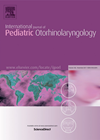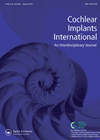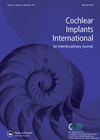
Journal Reviews
Cochlear implantation in asymmetric hearing loss
Criteria for cochlear implantation (CI) is a constant topic of debate. The UK traditionally had relatively restrictive guidance, although this has been greatly improved by more recent guidance released in 2019. Nevertheless, because of the lack of evidence for cost-effectiveness,...
Cochlear implantation in children with congenital long QT syndrome
Jervell and Lange-Neilsen syndrome is a condition where sensorineural deafness coincides with inherited abnormalities of the heart, resulting in prolonged ventricular repolarisation, frequently shown on an ECG with a prolonged QT interval. These children can present at implant centres for...
Cognition outcomes after cochlear implantation – is there an improvement?
Older adults with a severe to profound hearing loss are more at risk of cognitive decline than adults of a similar age with milder losses or normal hearing. This poses challenges, not only in the assessment process, but also for...
Does trainee participation in cochlear implant surgery affect operative times?
The role of surgical education is a very sensitive issue in spite of the obvious need and the obligation of doctors to pass on their knowledge and experience to the next generation. This study is very interesting as it assesses...
Cochlear implantation in immunosuppressed patients. Is it feasible?
The effectiveness of cochlear implantation has led to a relaxation of the candidate criteria. Patients who had been rejected in the past may now be accepted and their outcomes are encouraging. However, the acceptance of immunosuppressed patients as cochlear implant...
Review: Cochlear Implantation in SSD?
Contra lateral routing of signals (CROS) using hearing aids and bone conduction devices has been the conventionally accepted modality for the treatment of single sided hearing impairment. The CROS hearing aid has been found to improve speech understanding in noise,...
How can we assess children with complex needs?
In the early days of cochlear implantation, children with additional disorders were being excluded as poor candidates whereas today a large number of children with complex needs are being referred for cochlear implant assessment. However, the related problems include difficulties...











